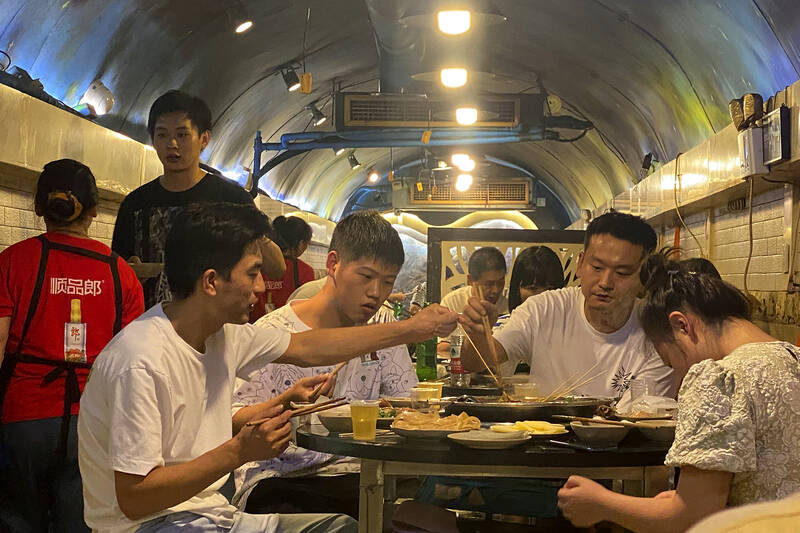The city of Chongqing, dubbed one of China’s four “furnace” cities, is known for both soaring temperatures and spicy cuisine — notably its hotpot, a peppery bubbling tabletop broth into which diners dunk bite-size pieces of food to cook and eat.
The inland metropolis on the Yangtze River has the perfect escape to enjoy hotpot, even in what has been a summer of unusually stifling heat: World War II-era air raid shelters, converted into restaurants, where the temperature is naturally cooler.
Locals call it “cave hotpot.”

Photo: AP
Chongqing was the temporary capital of China during World War II, as a Japanese invasion drove the government out of the then-capital, Nanjing, and occupied eastern China. Leader Chiang Kai-shek (蔣介石), the military, foreign diplomats and others set up in what was then a remote city in the southwest.
At the sound of air raid sirens, residents crowded into the often dark shelters dug into the hilly cityscape to protect people and military weapons. Thousands died in the Japanese aerial bombing attacks.
Today, the stone arch doorways of the former shelters still dot the city. Some have become cafes and mahjong parlors and others, restaurants.

Photo: AP
Red Chinese characters hang over one entrance, its stonework half-hidden by a refrigerated drinks display case and stacked up plastic chairs. The characters read: “Cave Pavilion Hotpot. Founded 1989.” Inside, tables and chairs line two long and narrow tunnels connected by a corridor. A starry night sky has been painted on the semicircular roof to reinforce a feeling of coolness. A painting of a World War II fighter plane hangs on the wall.
Diners drop beef tripe, meat, fish and vegetables into a bubbling broth filled with floating red chili peppers and lip-numbing Sichuan peppercorns. A non-spicy broth is also available — in a smaller container.
“We stay away from the summer heat in these air raid shelters,” said Tang Ronggang, as wisps of steam rose in front of his face from the hotpot on his table. “It’s cool in here, a good place to stay in summer.” Particularly this summer, which has seen what meteorologists are calling China’s strongest heat wave since the government began recording rainfall and temperature 61 years ago. High temperatures have persisted for more than two months, topping 40 degrees Celsius in many places.

Photo: AP
Shopping malls have closed in Chongqing for most of the daytime to conserve power. Wide swaths of the Yangtze and Jialing rivers, which meet in the city, have dried up, drawing people to the exposed riverbed. The extended heat and drought is blamed on a high-pressure system parked over western Russia that is also causing this summer’s heatwaves in Europe.
Chongqing, immediately east of Sichuan, was part of the province until the city and the surrounding area was broken off administratively in 1997.
Some date the city’s hotpot tradition to the 16th century, when porters ate meat and vegetables boiled with fiery spices after a hard day’s work on the docks on the Jialing River. The dish moved into abandoned air raid shelters in the 1970s, giving birth to a new tradition, the cave hotpot.

Last month historian Stephen Wertheim of the Carnegie Endowment for International Peace published an opinion piece in the New York Times with suggestions for an “America First” foreign policy for Democratic presidential candidate Kamala Harris. Of course China and Taiwan received a mention. “Under presidents Trump and Biden,” Wertheim contends, “the world’s top two powers have descended into open rivalry, with tensions over Taiwan coming to the fore.” After complaining that Washington is militarizing the Taiwan issue, he argues that “In truth, Beijing has long proved willing to tolerate the island’s self-rule so long as Taiwan does not declare independence

Big changes are afoot in global politics, which that are having a big impact on the global order, look set to continue and have the potential to completely reshape it. In my previous column we examined the three macro megatrends impacting the entire planet: Technology, demographics and climate. Below are international trends that are social, political, geopolitical and economic. While there will be some impact on Taiwan from all four, it is likely the first two will be minor, but the second two will likely change the course of Taiwan’s history. The re-election of Donald Trump as president of the US

Nov. 25 to Dec. 1 The Dutch had a choice: join the indigenous Siraya of Sinkan Village (in today’s Tainan) on a headhunting mission or risk losing them as believers. Missionaries George Candidus and Robert Junius relayed their request to the Dutch governor, emphasizing that if they aided the Sinkan, the news would spread and more local inhabitants would be willing to embrace Christianity. Led by Nicolaes Couckebacker, chief factor of the trading post in Formosa, the party set out in December 1630 south toward the Makatao village of Tampsui (by today’s Gaoping River in Pingtung County), whose warriors had taken the

The Mountains to Sea National Greenway (山海圳國家綠道) draws its name from the idea that each hiker starting at the summit of Jade Mountain (玉山) and following the trail to the coast is like a single raindrop. Together, many raindrops form life and prosperity-bringing waterways. Replicating a raindrop’s journey holds poetic beauty, but all hikers know that climbing is infinitely more appealing, and so this installment picks up where the last one left off — heading inland and uphill along the 49.8-kilometer Canal Trail (大圳之路) — second of the Greenway’s four sections. A detailed map of the trail can be found